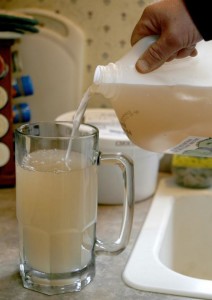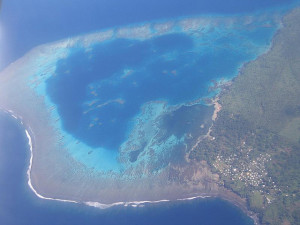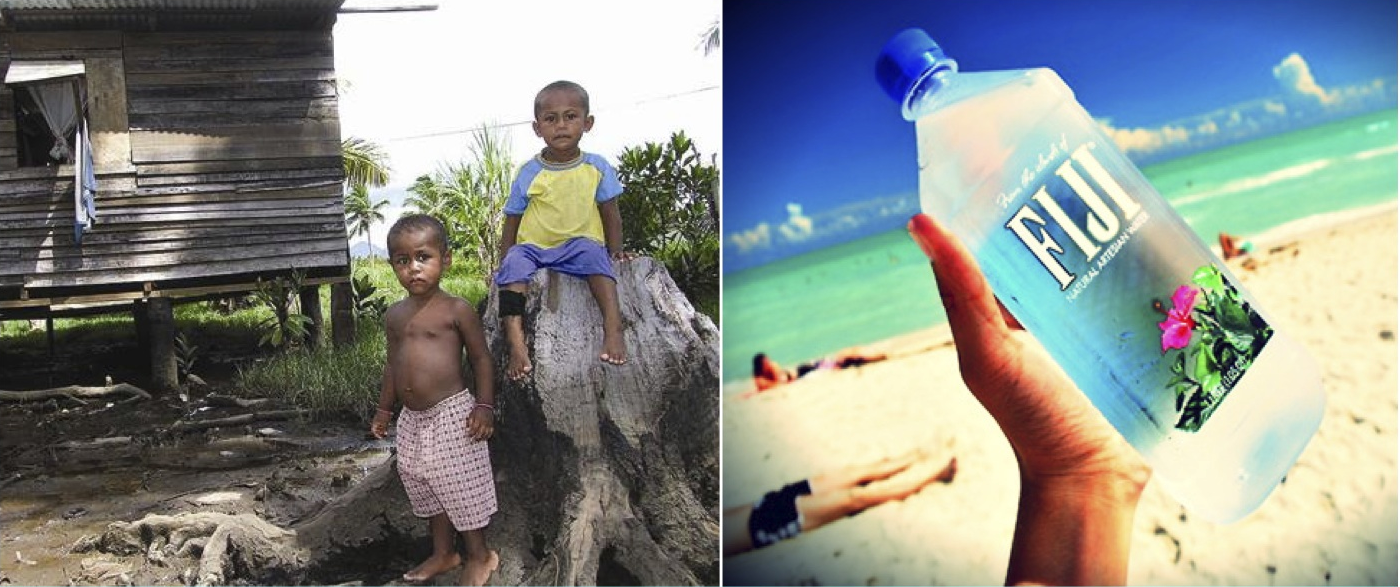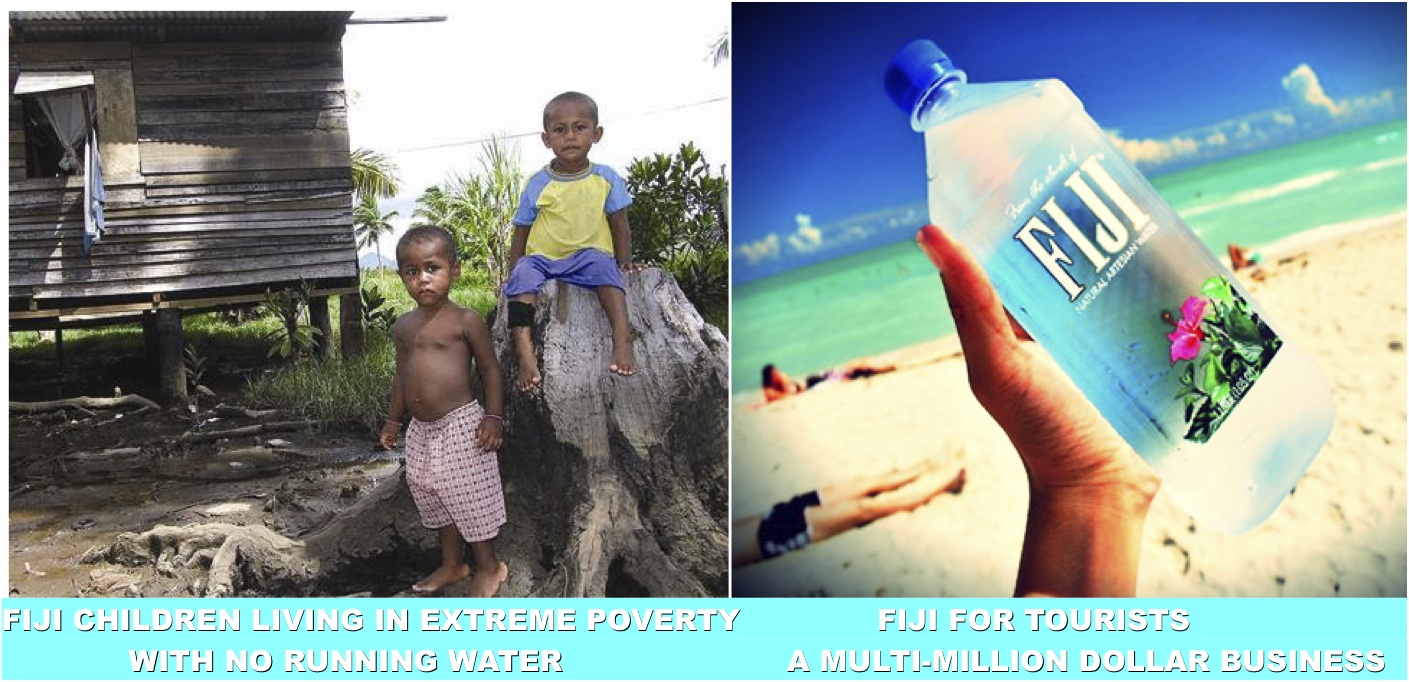Earlier this year, I saw a documentary about Chevron´s fracking exploits in the US and Poland. The film was presented by its director, who was hiding in a cave at the moment. Chevron was not very happy with the documentary, and his life was in danger. What I saw in the film included people getting cancer from the radioactive substances in Pennsylvania´s tap water, among other harrowing sights. You can watch the film, which is called Drill, baby, drill online for a few dollars.

I have been in the US for over a month now, and the problem of what water to drink is big concern for me. Coming from Uruguay, I am used to drinking affordable water that tastes very good. Uruguay is sitting on one of the largest aquifers on the planet, and faucet water tends to be rather reliable as well. When I drink most American bottled waters, they taste very bad to me. One of the few brands I like is Fiji.
Last week I had some inexplicable stomach problems. I generally cook, make tea, mate, and coffee with filtered water. My boyfriend thought it was a good idea to get a Brita water filter, and we have been using it for a few weeks. Concerned that the water might be messing with my system, especially because I drink large quantities of mate made from filtered water, I went and did some research about water filters.
US WATER FILTERS
I found out that most commercial water filters remove only a small fraction of the impurities and unwanted ingredients that may be present in tap water across America. For a Uruguayan, it is rather peculiar to see how much tap water Americans truly drink, for example, at restaurants, where it is a common practice to offer customers a full glass as soon as they take their seats.
Brita is one of the most popular water filter brands and, paradoxically, also one of the least reliable. Surprisingly, the much more reputable Culligan filters sometimes cost the same as Brita filters, but Brita still sells more. When I had my finger on the Return key, ready to buy a faucet filter by Culligan, I found the company´s site. It turned out that only special filters would remove things like what the poor Pennsylvanians were finding in their water. So, basically, Culligan might be better than Brita, but I would still be potentially drinking what me and my boyfriend started calling “cancer water.”
US BOTTLED WATER
So, I didn´t buy the cheap faucet filter and decided to try to schedule a visit from a Culligan man, who will allegedly test our faucet water for free and then recommend a filter. We are in Seattle. Our water is supposed to be coming down from glaciers, through pristine mountain territory. If you read the official reports, Seattle has the best faucet water in America. However, I found a reputable source that had tested Seattle water, finding it to be of mediocre quality, namely, Fair, when the top categories were Good and Excellent.
As I still didn´t possess a filter, I decided to start using my favorite American water for cooking, tea, mate, etc. So, I bought a lot of bottles of Fiji water. I researched Fiji water and it appears that what is in the bottle actually comes from Fiji, so, besides tasting good, it will probably not give us cancer.
Here is a reliable study from Environmental Working Group with information on most commercial bottled water brands sold in the US.
THE TROUBLE WITH FIJI
 When I came back from buying several 1.5 liter bottles of Fiji at the supermarket, I started thinking about Fiji. In my imagination, this is a rather small island, though I haven´t looked at it in the map in a while. Again, coming from Uruguay, I always think that when the war for oil is over, the war is gonna be for water, and our country will surely be a target. So, I started thinking about how many bottles of Fiji water must be needed to stock every single grocery chain in the US.
When I came back from buying several 1.5 liter bottles of Fiji at the supermarket, I started thinking about Fiji. In my imagination, this is a rather small island, though I haven´t looked at it in the map in a while. Again, coming from Uruguay, I always think that when the war for oil is over, the war is gonna be for water, and our country will surely be a target. So, I started thinking about how many bottles of Fiji water must be needed to stock every single grocery chain in the US.
Now, imagine Fiji, which has a surface only 18,274 square kilometers and a population of about 850,000 people feeding water to the US with its 313 million inhabitants and its surface of nearly 10 million square kilometers. Even if Fiji water is perceived as “expensive” in the US, the reality is that I have been buying two liters for three US dollars thanks to a promo which I could find across different stores. Naturally, I am not so naive to think that Fiji is the prime source of bottled water in America, but I would venture to say that the company has a sizable share of the market.
Yesterday, after we ate a delicious onion and leek soup I made with Fiji water, I said to my boyfriend, “I´m worried about the poor people of Fiji,” and he said, “Why?,” to which I replied, “Because Americans are drinking all of their water.”
Now, I had read the company´s claim that their exploitation of Fiji´s water resources is sustainable, and that had given me a certain level of peace of mind. However, I am not as naive as to believe everything companies say about themselves and their practices.
My questions and my concern about the people of Fiji lead to me do a simple Google search through which I found a British documentary and several articles about the problems with Fiji water.
THE BLOOD PRICE OF CRYSTALLINE WATER
I came to find out that Fiji is a horrible dictatorship, that the Fiji water company obtains succulent benefits from this undemocratic state that tortures and incarcerates dissidents, including young freedom bloggers. Once more, coming from Uruguay, I know what it means to live in a dictatorship like this. I know that any corporation having businesses with such a country is as low as they can go. I know that it is because of corporations like this that these regimes can go on killing people, starving their population, and last but not least, depriving them of clean running water.
The most ironic part of this story is that according to the most recent data I could find, one-third of Fiji’s inhabitants do not have access to clean drinking water. Meanwhile, the country exports about 130 million liters of water per year.
After learning all this, all I can think of is that I want to return to Uruguay, where no one´s blood is paying for my delicious water. If you are still inclined to buy water from Fiji, I leave you with a video of Fiji citizens being tortured by “security forces” which was uploaded on Youtube earlier this year and a BBC documentary, which may be easier to stomach. I only watched the first seconds of the video, because I know that if there is something that is going to make me sicker than cancer water, it is probably those images.
Free elections are scheduled in Fiji for September 2014. According to the opposition and international observers, the undemocratic government is using both military police and a set of decrees to make it impossible for a truly democratic process to occur.
I am curious to see what Fiji water might do if a political party that truly cares about the well-being of Fijians were to rule in the archipelago, consequently withdrawing some of the unlawful benefits and tax exemptions the company has enjoyed for many years.
INFORMATION ABOUT WATER FILTERS
INFORMATION ABOUT FIJI POLITICS: FIJILEAKS
Featured image by me. Free to use as long as you provide a link to this article.
Aerial image of Fiji by timoshea95

